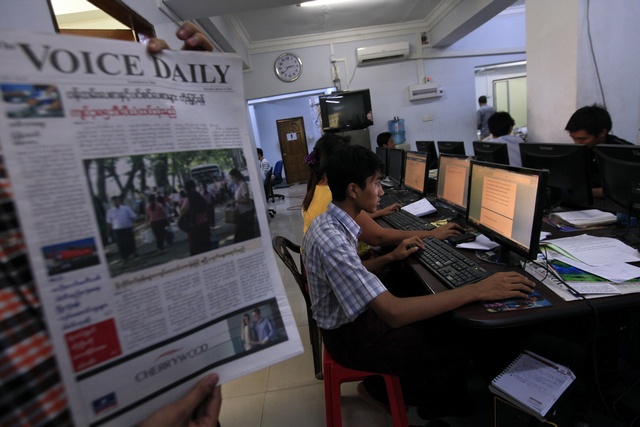The ongoing debate in the Upper House of Parliament over a new media law is set to be handed over to the bicameral assembly or Pyidaungsu Hluttaw after representatives of the Interim Press Council (IPC) and the Ministry of Information (MOI) failed to resolve differences over three key articles.
According to an MOI statement released on Monday, 14 out of the 17 draft articles have been agreed between the IPC and the MOI. The three issues which remain unresolved relate to: the issuing of media licences; whether to maintain one central Press Council or whether to devolve powers to local levels; and the definition of what is in the “public interest”.
IPC member Zaw Thet Htwe said he acknowledged the different points of view between the two groups, as well as among parliamentarians, and said that it would remain for legislators from both Houses of Parliament to make decisions on what will become law and what will be deleted.
“Whether we agree or not we have to respect and obey the decision of the MPs,” he said.
[related]
Meanwhile, a further draft law—the Printing and Publishing Enterprise Bill—continues to be debated in the Upper House. MPs told DVB on Tuesday that one of the five proposed articles had been rejected by the IPC.
Submitted by the MOI in February, the proposed Printing and Publishing Enterprise Bill has been heavily criticized by journalists and observers alike who said that the draft bill contains provisions that would allow for the imposition of authoritarian measures including censorship.
One of the disputed issues concerns draft article 7 which would dictate that media outlets refrain from publishing any statements that are “against and violate the provisions of the constitution and other legislation.”
The draft law, including the Lower House’s amendments, will now be passed to the Upper House for approval. If both bodies sign off on the bill, then the Union Parliament has the power to sign the legislation into law.
Once passed, the legislation will replace the draconian 1962 Printers and Publishers Registration Act that was commonly utilised by the country’s former military rulers to silence dissent and exert control over the fourth estate.
DVB reporters Aye Nai, Myo Zaw Lin, and Ko Htwe contributed to this story.



